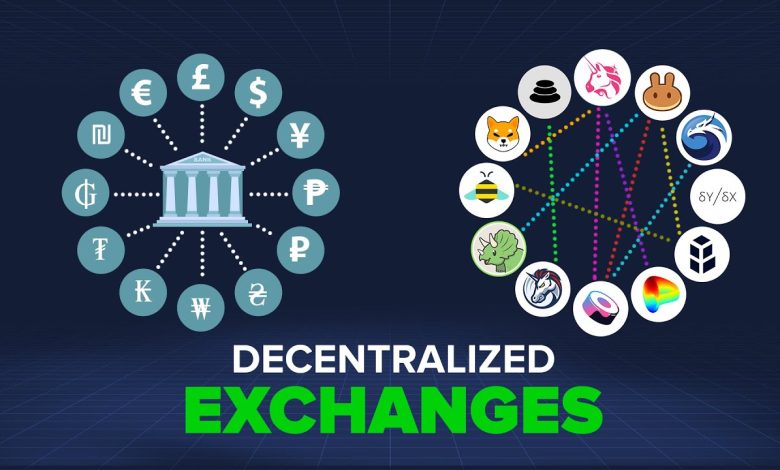How to Use Decentralized Exchanges (DEXs)

- Understanding Decentralized Exchanges (DEXs)
- Benefits of Using Decentralized Exchanges
- Choosing the Right Decentralized Exchange for You
- Security Measures to Consider When Using DEXs
- Tips for Trading on Decentralized Exchanges
- The Future of Decentralized Exchanges
Understanding Decentralized Exchanges (DEXs)
Decentralized exchanges (DEXs) are platforms that allow users to trade cryptocurrencies directly with one another without the need for a central authority to facilitate the transactions. This peer-to-peer model offers increased security and privacy compared to centralized exchanges, as users retain control of their funds throughout the trading process.
One of the key advantages of DEXs is that they eliminate the need for users to trust a third party with their funds. Instead, trades are executed using smart contracts, which are self-executing agreements with the terms of the trade written into code. This reduces the risk of hacks or theft that can occur on centralized exchanges.
Another benefit of DEXs is that they are often more resistant to censorship and government intervention. Since there is no central authority controlling the exchange, users can trade freely without worrying about their transactions being blocked or monitored. This can be especially important for users in countries with strict regulations on cryptocurrency trading.
While DEXs offer many advantages, it’s important to note that they can also have limitations. For example, liquidity on DEXs is typically lower than on centralized exchanges, which can result in higher price volatility and slower trade execution times. Additionally, the user experience on DEXs may not be as polished as on centralized exchanges, as they are often built by community developers rather than professional teams.
Overall, understanding how decentralized exchanges work and the benefits they offer can help you make informed decisions about where to trade your cryptocurrencies. By weighing the pros and cons of DEXs against centralized exchanges, you can choose the platform that best suits your needs and preferences.
Benefits of Using Decentralized Exchanges
Decentralized exchanges (DEXs) offer several benefits compared to centralized exchanges. One of the main advantages is **increased** security. DEXs do not hold users’ funds, reducing the risk of hacks and theft. Additionally, transactions on DEXs are **peer-to-peer**, meaning users have more control over their assets.
Another benefit of using DEXs is **privacy**. Since users do not need to create accounts or provide personal information, their transactions are **anonymous**. This can be appealing to those who value their privacy and want to keep their financial activities confidential.
DEXs also promote **financial** inclusion by allowing anyone with an internet connection to trade assets. There are no restrictions based on location or identity, making it easier for people in **underserved** regions to access financial services.
Furthermore, DEXs offer **lower** fees compared to centralized exchanges. Since there is no intermediary involved in transactions, users can avoid paying high fees for trading. This can result in **significant** savings, especially for frequent traders.
In conclusion, decentralized exchanges provide a secure, private, and cost-effective way to trade assets. By leveraging the benefits of DEXs, users can take control of their finances and participate in the growing world of decentralized finance.
Choosing the Right Decentralized Exchange for You
When it comes to choosing the right decentralized exchange (DEX) for your needs, there are several factors to consider. One of the most important things to look at is the user interface. **User-friendly** interfaces can make trading on a DEX much easier and more intuitive. Additionally, you’ll want to consider the **liquidity** of the exchange. Higher liquidity means that there will be more trading opportunities and tighter **spreads**.
Another important factor to consider is the **security** of the DEX. Look for exchanges that have a good track record of **security** and have never been hacked. Additionally, consider the **fees** associated with trading on the exchange. Some DEXs have high fees, while others offer **competitive** rates.
It’s also important to consider the **range** of **tokens** available on the exchange. Some DEXs offer a wide variety of **tokens** to trade, while others have a more limited selection. Finally, consider the **customer** support offered by the exchange. **Responsive** customer support can be crucial if you run into any issues while trading.
By taking these factors into account, you can choose the right decentralized exchange for your trading needs. Whether you prioritize **security**, **liquidity**, **fees**, or **customer** support, there is a DEX out there that will meet your requirements.
Security Measures to Consider When Using DEXs
When using decentralized exchanges (DEXs), it is crucial to consider various security measures to protect your assets and personal information. Here are some important steps to take to enhance the security of your DEX transactions:
- Enable two-factor authentication (2FA) whenever possible to add an extra layer of security to your account.
- Use a hardware wallet to store your funds securely offline and reduce the risk of hacking.
- Avoid sharing your private keys or seed phrases with anyone to prevent unauthorized access to your funds.
- Regularly update your wallet software and DEX platform to patch any security vulnerabilities.
- Verify the authenticity of the DEX website before entering any sensitive information to avoid phishing scams.
By following these security measures, you can minimize the risk of falling victim to cyber attacks and protect your investments while using DEXs. Remember that security should always be a top priority when engaging in decentralized trading.
Tips for Trading on Decentralized Exchanges
When trading on decentralized exchanges (DEXs), it is important to keep in mind a few tips to ensure a smooth and successful experience. Here are some key points to consider:
- Research the DEX platform you plan to use to understand its features and functionality.
- Secure your private keys and use a hardware wallet for added security.
- Start with small trades to familiarize yourself with the platform and minimize risks.
- Be mindful of liquidity on the DEX to ensure you can execute trades at desired prices.
- Consider using limit orders to have more control over the price at which your trades are executed.
- Stay informed about market trends and news that could impact the assets you are trading.
- Regularly review your trading strategy and adjust it as needed based on your goals and market conditions.
By following these tips, you can navigate the world of decentralized exchanges with confidence and make informed trading decisions. Remember to always prioritize security and stay informed to maximize your trading success on DEXs.
The Future of Decentralized Exchanges
The future of decentralized exchanges (DEXs) looks promising as more users become aware of the benefits of trading without relying on a central authority. DEXs offer increased security, privacy, and control over assets compared to traditional exchanges. With the rise of blockchain technology, DEXs are expected to play a significant role in the future of cryptocurrency trading.
One of the key advantages of DEXs is the ability to trade directly from your wallet without the need to deposit funds on an exchange. This eliminates the risk of hacks or theft of funds from centralized exchanges. Additionally, DEXs allow users to maintain control of their private keys, ensuring that only they have access to their assets.
Another important aspect of the future of DEXs is the development of more user-friendly interfaces and features. As the technology continues to evolve, DEXs are becoming easier to use for both experienced traders and newcomers to the cryptocurrency space. This increased accessibility is expected to attract more users to decentralized exchanges in the future.
Furthermore, the future of DEXs is likely to see increased liquidity as more projects and tokens are listed on these platforms. This will provide users with a wider range of trading options and opportunities to diversify their portfolios. As liquidity improves, DEXs will become more competitive with centralized exchanges in terms of trading volume and market depth.
Overall, the future of decentralized exchanges is bright, with continued innovation and development expected to drive growth in the sector. As more users recognize the benefits of trading on DEXs, these platforms are likely to become an integral part of the cryptocurrency ecosystem in the years to come.



